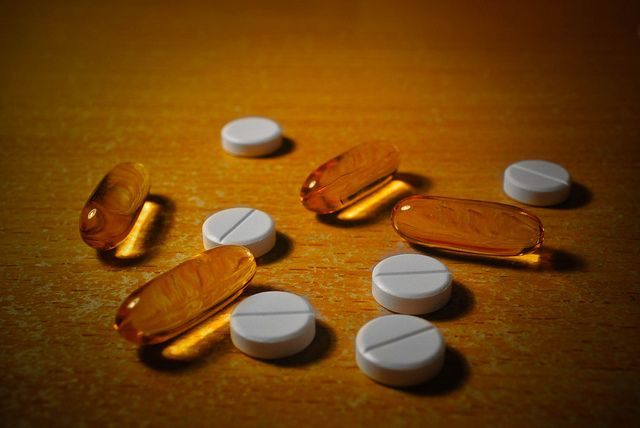Lack Of Evidence Suggests Women Taking Antioxidants Won't Increase Chances Of Fertility

Coping with infertility can be very difficult in both an emotional and physical way. Fertility tests, tracking ovulation, or even failed attempts at in vitro fertilization can culminate into a more frustrating than intimate experience. Many women have tried antioxidant supplements during subfertility — trying to conceive for more than a year with no success — but their attempts may be in vain, as new research has found that women aren't more likely to conceive when taking antioxidants.
"There is no evidence in this review that suggests taking an antioxidant is beneficial for women who are trying to conceive," Marian Showell, of Obstetrics and Gynecology at the University of Auckland and lead researcher of the study, said in a press release.
Antioxidants Vs. Placebos
The researchers looked at data from 28 trials of 3,548 female fertility clinic patients. They compared various oral antioxidant supplements, including vitamin C, vitamin D+calcium, omega-3s, and melatonin. They found no link between antioxidant supplements and a better chance at conceiving, when compared to placebos. Women who had an expected live birth rate of 37 percent had a 10 to 83 percent likeliness of giving birth, while women with a clinical pregnancy rate of 23 percent had a 22 to 36 percent chance of getting there with antioxidants.
Read more: New Pregnancy App Glow Helps Couples Conceive By Telling Men When To Bring Home Flowers
"I don't think the results were surprising in the sense that there are no national organizations or guidelines that recommend routine use of antioxidant supplements for fertility," Dr. Wendy Vitek, head of the fertility preservation program at the University of Rochester's Strong Fertility Center, told the Huffington Post.
Antioxidant supplements are also largely unregulated, and there has been little research on their safety and side effects. Regardless, women who are told about antioxidants take them with hope that they will be able to reduce the oxidative stress that may deteriorate their reproductive system as they remain subfertile. Oxidative stress can disrupt the normal redox state of cells, damaging them and their DNA through the production of peroxides and free radicals. Subfertile women may experience ovulatory disorders, poor egg quality, fallopian tube damage, and endometriosis as a result of oxidative stress, the researchers wrote.
"It is thought that the free radical 'scavenging' effects of antioxidants would help to repair any oxidative stress occurring in the female reproductive process," Showell told the Huffington Post. "This has not been disproven by this review. We just didn't have enough quality evidence to prove or disprove it."
Read more: Trying To Conceive? Natural Birth Control Method Also Works As A Conception Calculator
Although Dr. Vitek wasn't part of the study, she said that many women visit her asking for supplements, hoping to be "proactive" in "potentialy contolling a very uncontrollable situation."
Between 10 and 15 percent of U.S. couples have difficulty conceiving. Causes for subfertility or infertility range, and sometimes it can be unclear which partner is having difficulty with fertility. According to The National Institutes of Health, fertility issues can be traced to the woman about a third of the time, and the man for another third; however, the rest of the time is either because of a mix of both partners or there is just no cause found.
Could antioxidants actually have adverse effects on fertility?
In 14 of the 28 trials, the researchers even found evidence of adverse effects as a result of taking antioxidants. These included miscarriage, ectopic pregnancy, and gastrointestinal effects; however, they said their data was limited.
Still, there has been other evidence suggesting that antioxidants might hinder conception. A team of researchers at the Biological Regulation Department in Israel studied the effects of antioxidants in female mice. They found that when antioxidants were applied to their ovaries, ovulation levels dropped significantly. They realized that the biological process that results in pregnancy could actually rely on the harmful peroxides that antioxidants destroy.
Read more: Women Let Body Hair Grow for Armpits4August, Spreading PCOS Awareness, A Condition Of Infertility
They tested ovaries again, this time using luteinizing hormone — the hormone responsible for ovulation — and hydrogen peroxide on ovarian follicles. The researchers found that hydrogen peroxide mimicked the effects of the luteinizing hormone.
"Together, our results provide evidence that ovarian production of reactive oxygen species (hydrogen peroxide) is an essential preovulatory signaling event, most probably transiently triggered by luteinizing hormone," they wrote in the study.
Sources: Showell M, Brown J, Clarke J, et al. Antioxidants for female subfertility. The Cochrane Library. 2013.
Shkolnik K, Tadmor A, Ben-Dor S, et al. Reactive oxygen species are indispensable in ovulation. PNAS. 2010.
Published by Medicaldaily.com



























